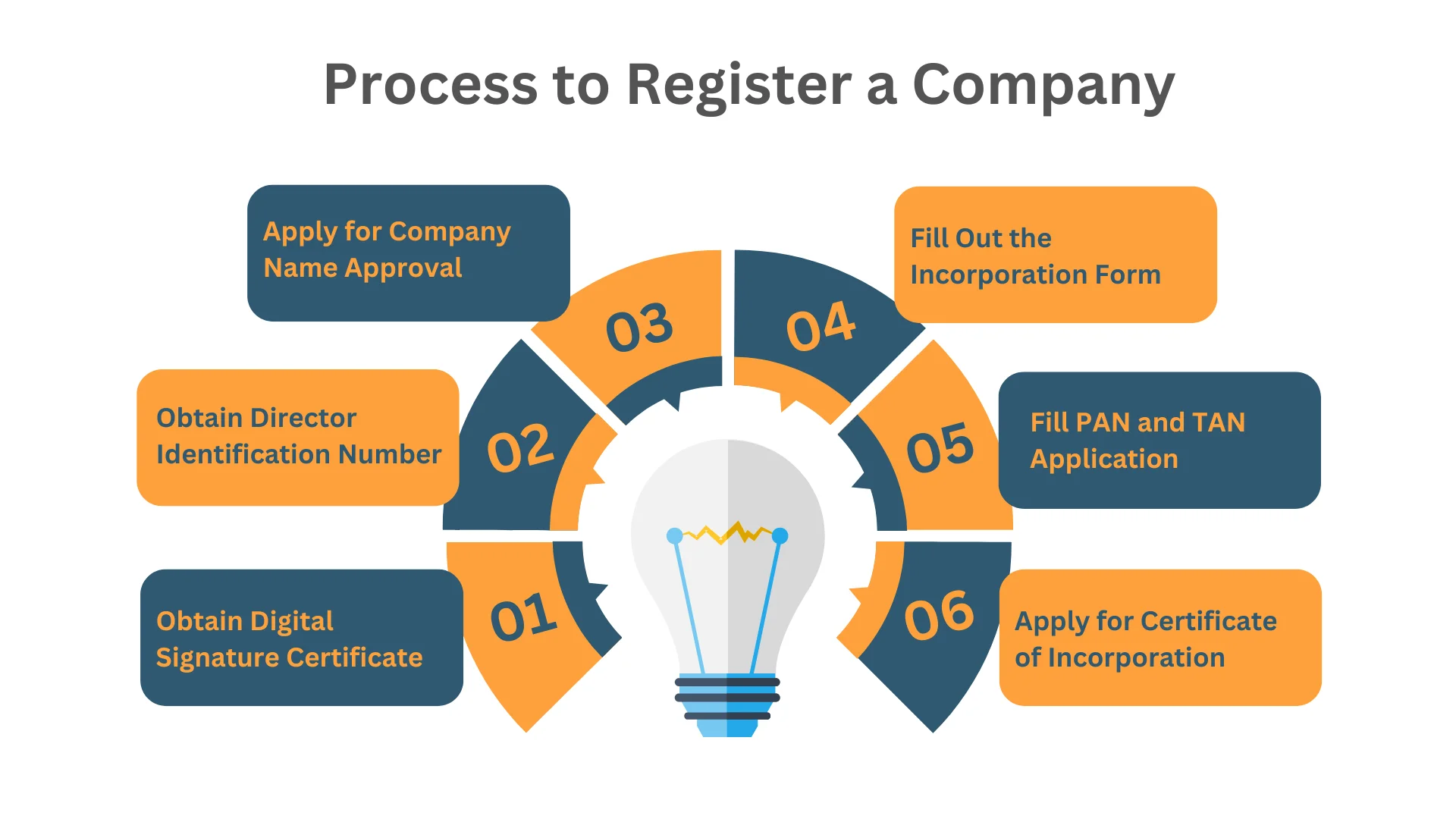
Get Instant Solution By an Expert Advisor
(4.8)
Dreaming of launching your Indian business? Let's make it happen! Get your Company Registered Today! Don't just dream it, build it! We're here to guide you through every step with passion and expertise. Let's turn your vision into a reality. Register now and ignite your success story.


10000 +
Projects Completed for Our Respected Clients.
15 +
Years Experienced Advisors in Indian Compliance.
98.9%
Project Delivery Ratio for Our Valuable Clients.
99.9%
Satisfied Customers All Over India.
The first legal requirement for a company in India is to register with government authorities under Indian law. The mandatory company registration process establishes legal status while ensuring business protection through credibility and privacy status that lets firms expand their operations. The Companies Act 2013 under the Ministry of Corporate Affairs oversees company registration through defined legal regulations.
Before initiating essential official procedures every Indian company must choose their preferred business entity and meet registry requirements. Selecting an appropriate business structure gives companies three vital advantages which are operational convenience, tax advantages, and financial planning capabilities.
When starting a business it is important to choose the correct organizational structure because it determines tax obligations, legal liability, ownership principles, and regulatory standards. There are three primary business structures operated in India which include:

A sole proprietorship is the simplest business structure form. Here, a single individual owns and operates the business. It is ideal for small-scale businesses and freelancers.
Businesses under a partnership structure exist between two or more people who agree to distribute both profits and loss.
Introduced under the Companies Act, 2013. An OPC is a hybrid structure allowing a single person to own and manage a company with limited liability.
An LLP offers both partnership traits and corporate features as an entity. LPs grant partners limited liability protection together with flexibility for operating their business.
A private limited company is a separate legal entity where ownership is divided into shares.
A public limited company is a large-scale business entity that can raise capital from the public through stock market listings.
Below is a comparison of the popular business structures in India, highlighting their suitability, tax benefits, and legal compliances.
| Business Structure | Best For | Tax Benefits | Legal Compliance |
| Sole Proprietorship | Small businesses and individual entrepreneurs | no separate business tax. The income is taxed as per individual rates | Minimal compliance; only personal tax returns required |
| Partnership Firm | Small businesses with multiple owners | No double taxation; income taxed at firm level | Partnership deed registration recommended; tax returns required |
| Limited Liability Partnership | Service-based businesses or startups with low investment needs | Tax holiday for the first 3 years under Startup India. There are depreciation benefits | Business tax returns and LLP annual returns must be filed |
| One Person Company | Sole owners seeking limited liability | Tax holiday for the first 3 years under Startup India. There is no dividend distribution tax | Business tax returns and ROC filings required |
| Private Limited Company | Startups and business planning to scale | Tax holiday for the first 3 years under Startup India. There are higher depreciation benefits | Business tax returns, ROC filings, and mandatory audits are required. |
| Public Limited Company | Large businesses that have turnover and public funding | Tax holiday for the first 3 years under Startup India | Business tax returns, ROC filings, and mandatory audits are required. |
Selecting the appropriate business structure depends on various factors such as ownership, liability, compliance requirements, and funding needs:
Investment Needs: If seeking external funding, an LLP or private limited company is more suitable.
Compliance Requirements: Higher compliance is required for companies compared to proprietorships and partnerships.
Ownership Structure: Sole proprietorships are best for single owners, whereas partnerships, LLPs, and private limited companies suit multiple owners.
Liability Protection: LLPs and companies provide limited liability protection, whereas proprietorships and partnerships involve personal liability.
Taxation: Different structures have varied tax implications. For example, companies have a flat tax rate, while sole proprietors are taxed under individual slabs.
The MCA functions as the leading regulatory institution in India which performs both company registration responsibilities and regulation oversight duties. The MCA maintains company regulation responsibilities according to the Companies Act, of 2013 while overseeing corporate situations:
There are several steps in the process of company registration in India:

Step 1: Obtain Digital Signature Certificate (DSC): Since registration is done online. A DSC is required for directors and subscribers. It can be obtained from government-certified agencies.
Step 2: Obtain Director Identification Number (DIN): DIN is a unique identification number for directors. This number is obtained while filing the SPICe+ form for company registration.
Step 3: Name Approval: The proposed company name must be unique and comply with MCA guidelines. It is approved through the RUN (Reserve Unique Name) service.
Step 4: Filing the Incorporation Form: The SPICe+ form is used for company incorporation. It includes details about directors, shareholders, and business objectives.
Step 5: PAN and TAN Application: The company is required to apply for a Permanent Account Number (PAN) and Tax Deduction and Collection Account Number (TAN) through the MCA portal.
Step 6: Certificate of Incorporation: Once all documents are verified, the MCA issues the Certificate of Incorporation, officially recognizing the business entity.
The cost of company registration varies and it is based on the type of business structure and professional fees. Government fees range from ₹2,000 to ₹10,000, depending on the authorized capital
Legal Recognition and Credibility: A registered company gains official recognition from the government, establishing its legitimacy. This enhances trust among customers, suppliers, and potential business partners.
Limited Liability Protection: Owners and shareholders enjoy limited liability, meaning their personal assets remain protected in case of business debts or legal issues. This ensures financial security and reduces risks.
Easier Fundraising and Investment Opportunities: A registered company can raise capital through bank loans, venture capital, and investments from angel investors. It also becomes easier to issue shares and attract stakeholders.
Perpetual Succession: The company continues to exist even if ownership changes due to the resignation, retirement, or passing of shareholders. This ensures long-term stability and smooth business operations.
Tax Benefits and Incentives :Certain business structures, such as private limited companies and LLPs, enjoy tax benefits, deductions, and exemptions. These financial advantages help reduce the overall tax burden and increase profitability.
Agile Regulatory helps businesses in seamless company registration, ensuring compliance and efficient legal formalities. Their services include:
Comprehensive Documentation Assistance – Guiding businesses through the preparation and verification of essential documents required for company registration, ensuring accuracy and completeness.
Legal Advisory & Compliance Management – Providing expert consultations on business structure, tax obligations, and regulatory requirements to ensure full compliance with local laws.
Filing & Approval Process – Handling the submission of registration forms, liaising with regulatory bodies, and obtaining necessary approvals to expedite the registration process.

Get Instant Solution By an Expert Advisor
(4.8)
Company registration usually takes 7-10 working days, depending on document submission and government processing time
Yes, foreign nationals can register a company in India by appointing an Indian director and fulfilling necessary compliance
There is no minimum capital required to register a private limited company in India
GST registration is required if the company’s turnover exceeds the prescribed threshold
Yes, a single individual can register a One Person Company (OPC) in India
Non-compliance with company regulations can result in fines, penalties, and even company dissolution by the MCA
Proven 4-step Process: Consultation, Documentation, Submission, and Certification.
Startups to large enterprises, we deliver end-to-end solutions business compliance needs.

What our customer says about us
Fantastic support from the team. Their expertise transformed our approach, driving remarkable outcomes. A must-have partner for businesses seeking effective consulting solutions. Highly recommended.

Lavkush Sharma
KTPL Instruments
Agile Regualtory delivers exceptional solutions. Their insightful guidance streamlined our processes and boosted profitability. Highly recommended for businesses seeking expert consulting services to thrive.

Nitin Mukesh
Justrack IOT
Impressed by Agile Regulatory's expertise. Their strategic insights and practical solutions have elevated our business operations. A reliable partner for effective consulting services. Highly recommended for growth-focused businesses.

Pradeep Varma
Coaire Compressor
Extraordinary consulting services. Their insightful solutions and dedicated team reshaped our business, driving remarkable improvements. Highly recommend it for transformative results.

Bharat Bachwani
Easy Polymer
Incredible experience with Agile Regulatory. Their innovative strategies and expert advice revitalized our business model, resulting in impressive growth. Highly recommend their exceptional consulting services.

Atul Jain
Tarus International
Top-tier consulting! offered strategic solutions that revolutionized our approach. Their deep expertise and personalized guidance made a significant impact on our success. Highly recommend their services.

Paramjeet Singh
Anchor Weighing
Agile Regulatory exceeded expectations! Their tailored solutions, expertise, and proactive approach led to remarkable results. Highly recommend for businesses seeking impactful and strategic guidance.

Anshul Rathi
AM Capacitor
Outstanding service! delivered targeted solutions with professionalism and expertise. Their insights elevated our business strategies, resulting in noticeable growth. Highly recommended for exceptional consultation.

Shekhar Maurya
Imaxx Pro Aquistic